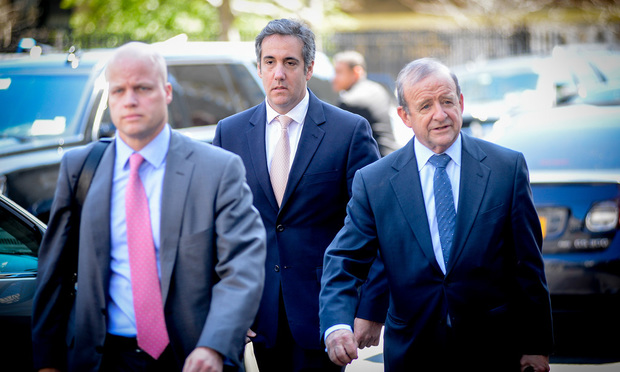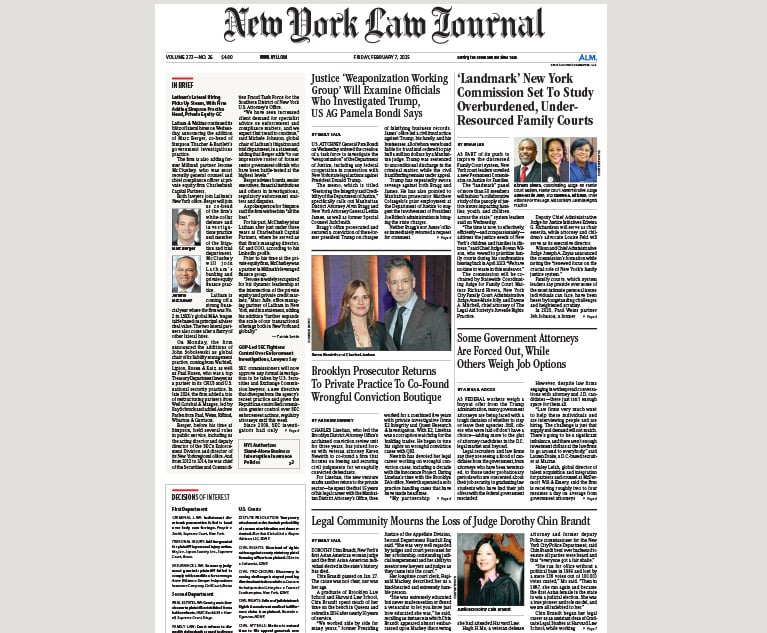Judge Questions Michael Cohen's Bid for Indemnification From Trump Org
More than $1 million of the $1.9 million in legal fees Cohen is seeking to have the Trump Organization pay is owed to McDermott Will & Emery.
August 06, 2019 at 06:11 PM
4 minute read
 Michael Cohen, center, arrives at Manhattan federal court April 26, 2018, with his then-attorneys at McDermott Will & Emery, Todd Harrison, left and attorney Stephen Ryan, right. Photo: David Handschuh/NYLJ
Michael Cohen, center, arrives at Manhattan federal court April 26, 2018, with his then-attorneys at McDermott Will & Emery, Todd Harrison, left and attorney Stephen Ryan, right. Photo: David Handschuh/NYLJ
Lawyers for President Donald Trump’s former lawyer Michael Cohen took tough questions from a New York judge in their effort to make the Trump Organization pay for Cohen’s $3.8 million in legal fees, back taxes and criminal penalties.
After oral arguments Tuesday, Manhattan Supreme Court Justice Joel Cohen didn’t rule or indicate that he had his mind made up between Cohen’s version of events and the one advanced by the president’s real estate company. He pondered aloud whether Trump’s company could be made to pay for certain costs.
The judge’s questioning did prompt W. Hunter Winstead, Cohen’s lawyer and a partner at Gilbert, to back off a position taken in Cohen’s complaint that the Trump Organization is on the hook for certain amounts that Cohen was ordered to pay as part of his criminal sentence. At least the $1.3 million in back taxes Cohen was made to pay is “not appropriate for reimbursement,” Winstead said. Other amounts he said he would have to parse more closely.
That leaves about $1.9 million in legal fees and perhaps another $600,000 related to his criminal case that Cohen could still be seeking from the Trump Organization. More than $1 million of the $1.9 million in legal fees is owed to McDermott Will & Emery. The remainder is owed to firms including Petrillo Klein & Boxer, Blakely Law Group, Lanny Davis’ law firm Davis Goldberg & Galper and Monico & Spevack.
Cohen filed his suit in March, alleging an indemnification agreement required the Trump Organization to reimburse him for the expenses. He was an executive at the organization until early 2017.
Most of Tuesday’s hearing was focused on the nature of the Trump Organization’s alleged commitment to cover Cohen’s legal bills. In an affidavit, Cohen said Alan Garten, the real estate company’s general counsel, made an oral agreement in July 2017 to cover his legal bills.
The scope of any such deal, which Cohen’s lawyer Steve Ryan of McDermott mentioned in a letter to Garten that sought payment, was fiercely debated at Tuesday’s hearing.
Marc Mukasey of Mukasey Frenchman & Sklaroff, who represents the Trump Organization, said it was simply not plausible that Garten had pledged to cover every dime of Cohen’s legal bills for the indefinite future. He said a more reasonable reading of Ryan’s letter was that it applied to a single congressional investigation that was alluded to.
Winstead said his client’s records showed that was not the case, however. The Trump Organization paid for more than $1 million of Cohen’s legal bills that clearly went beyond a single congressional probe, he said, and further discovery would make that even clearer.
Justice Cohen’s questions highlighted that the open-ended nature of the alleged commitment made by the Trump Organization, and he explored whether Trump’s company could be made to pay for costs related to some of Cohen’s legal troubles, but not others. While the statute of frauds requires long-term commitments be put to writing, the judge raised the prospect that the Trump Organization had agreed to pay the costs for investigations that existed at the time, if not for the dozen-ish that eventually arose.
“As a general rule, if part of an entire contract is void under the statute of frauds, the whole contract is void,” he said later, putting a question to Mukasey. “However, where an oral agreement is severable, meaning susceptible to division and apportionment … that part which, if standing alone, is not required to be in writing, may be enforced.”
Mukasey said he didn’t think that’s what Cohen had argued in his complaint.
The judge didn’t indicate when he would rule on the Trump Organization’s motion to dismiss.
Cohen was sentenced to three years in prison after pleading guilty to tax evasion, campaign-finance violations and lying to Congress. He is currently incarcerated at Otisville Federal Correctional Institution, with a release date of Dec. 13, 2021, according to records from the Bureau of Prisons.
This content has been archived. It is available through our partners, LexisNexis® and Bloomberg Law.
To view this content, please continue to their sites.
Not a Lexis Subscriber?
Subscribe Now
Not a Bloomberg Law Subscriber?
Subscribe Now
NOT FOR REPRINT
© 2025 ALM Global, LLC, All Rights Reserved. Request academic re-use from www.copyright.com. All other uses, submit a request to [email protected]. For more information visit Asset & Logo Licensing.
You Might Like
View All
Lawyers Across Political Spectrum Launch Public Interest Team to Litigate Against Antisemitism
4 minute read
'A Shock to the System’: Some Government Attorneys Are Forced Out, While Others Weigh Job Options
7 minute read
Haynes and Boone Expands in New York With 7-Lawyer Seward & Kissel Fund Finance, Securitization Team
3 minute readTrending Stories
- 1There's a New Chief Judge in Town: Meet the Top Miami Jurist
- 2RIP DOJ FCPA Corporate Prosecutions
- 3Federal Trade Commission’s Updates to the Health Breach Notification Rule Now In Effect
- 4I’m A Lawyer, What Can I Sell?
- 5Internal GC Hires Rebounded in '24, but Companies Still Drawn to Outside Candidates
Who Got The Work
J. Brugh Lower of Gibbons has entered an appearance for industrial equipment supplier Devco Corporation in a pending trademark infringement lawsuit. The suit, accusing the defendant of selling knock-off Graco products, was filed Dec. 18 in New Jersey District Court by Rivkin Radler on behalf of Graco Inc. and Graco Minnesota. The case, assigned to U.S. District Judge Zahid N. Quraishi, is 3:24-cv-11294, Graco Inc. et al v. Devco Corporation.
Who Got The Work
Rebecca Maller-Stein and Kent A. Yalowitz of Arnold & Porter Kaye Scholer have entered their appearances for Hanaco Venture Capital and its executives, Lior Prosor and David Frankel, in a pending securities lawsuit. The action, filed on Dec. 24 in New York Southern District Court by Zell, Aron & Co. on behalf of Goldeneye Advisors, accuses the defendants of negligently and fraudulently managing the plaintiff's $1 million investment. The case, assigned to U.S. District Judge Vernon S. Broderick, is 1:24-cv-09918, Goldeneye Advisors, LLC v. Hanaco Venture Capital, Ltd. et al.
Who Got The Work
Attorneys from A&O Shearman has stepped in as defense counsel for Toronto-Dominion Bank and other defendants in a pending securities class action. The suit, filed Dec. 11 in New York Southern District Court by Bleichmar Fonti & Auld, accuses the defendants of concealing the bank's 'pervasive' deficiencies in regards to its compliance with the Bank Secrecy Act and the quality of its anti-money laundering controls. The case, assigned to U.S. District Judge Arun Subramanian, is 1:24-cv-09445, Gonzalez v. The Toronto-Dominion Bank et al.
Who Got The Work
Crown Castle International, a Pennsylvania company providing shared communications infrastructure, has turned to Luke D. Wolf of Gordon Rees Scully Mansukhani to fend off a pending breach-of-contract lawsuit. The court action, filed Nov. 25 in Michigan Eastern District Court by Hooper Hathaway PC on behalf of The Town Residences LLC, accuses Crown Castle of failing to transfer approximately $30,000 in utility payments from T-Mobile in breach of a roof-top lease and assignment agreement. The case, assigned to U.S. District Judge Susan K. Declercq, is 2:24-cv-13131, The Town Residences LLC v. T-Mobile US, Inc. et al.
Who Got The Work
Wilfred P. Coronato and Daniel M. Schwartz of McCarter & English have stepped in as defense counsel to Electrolux Home Products Inc. in a pending product liability lawsuit. The court action, filed Nov. 26 in New York Eastern District Court by Poulos Lopiccolo PC and Nagel Rice LLP on behalf of David Stern, alleges that the defendant's refrigerators’ drawers and shelving repeatedly break and fall apart within months after purchase. The case, assigned to U.S. District Judge Joan M. Azrack, is 2:24-cv-08204, Stern v. Electrolux Home Products, Inc.
Featured Firms
Law Offices of Gary Martin Hays & Associates, P.C.
(470) 294-1674
Law Offices of Mark E. Salomone
(857) 444-6468
Smith & Hassler
(713) 739-1250







